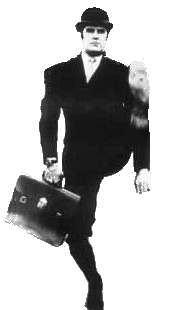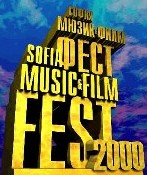Although it began as the Rock Film Fest in the mid-1990s, the fourth Sofia Music and Film Fest took full advantage of its new image and format to showcase a broad film and musical repetoire.
In its early years, the festival presented exclusively musical feature films and documentaries, as well as a live music programme that included small Bulgarian and guest bands playing in open venues. As the production of musicals is limited on a global scale, let alone on a Bulgarian one, the organizers were forced to search for a new format for the festival.
In its current form, the Music and Film Festival (MFF) brings together quality cinematic productions from all over the world, including invitees this year from Great Britain, the United States, the Czech Republic, France, Germany, Greece, Macedonia, Korea, Poland and Denmark. It also accentuated a huge musical scene of international performers, including concerts in the Palace of Culture (Anastasia) and performances in various night clubs in the capital (such as Indigo and Vsi Svetii).
The old and the new
The very name of the festival presupposes free arrangement of the "oldest" and "newest" art, and the organizers have taken full and professional advantage of this freedom. The result this year was not a mere compilation of film titles and musical groups, but an artistic arrangement of thematic, cinematographic and directorial choices.
The festival's chief director and producer, Stefan Kitanov, is a former director of the Bulgarian Palace of Cinema, and has become known to Bulgarian cinema audiences through various cultural events he initiated and developed in the 1990s, including the Monthy Python Fest, British Cinema of the 90s and New French Cinema. festivals
Kitanov has also been an associate producer of two British films: England My England (1995) and Mystery of Chopin (1999).
The MFF stands alongside two other outstanding cinema events in Bulgaria: the competition-based Love is Folly and Cinemania, both of which take place annually. The Festival, however, is unique in its allegiances to parallel musical events, and is the only one of its kind in the Balkans, if not in a wider region.
Kitanov said the organizers devote a great deal of attention to selection and planning of the cinematic events for MFF, noting that, "We have tried not to select films casually. We intended to present the most highly valued world and regional cinema from the past to the present. This distinguishes the festival from the rest of the Bulgarian film fests."
Festival of themes
The festival was organized around six themes, including world cinema premieres in Bulgaria and screenings of films nominated for the 1999 Oscars, while other themes included single projection of international cinema, a retrospective of all of Lars von Trier's productions, and films centering on male or female specific issues.
With special guest Terry Jones, the festival was also a hit for its presentation of the complete feature film repertoire of Monty Python, who remain popular in Bulgaria among a hard-core of fans. Prior to this year's MFF, Monty Python was known in Bulgaria primarily among die-hard fans and a core of English speakers, as state television only screened Monty Python's Life of Brian and sketches from the group's American tour in the late 1980s, thanks largely to the efforts of critic Todor Andreykov.
 |
| John Cleese: Minister for Silly Walks |
Thus, while some forms of humour are unable to straddle national and cultural divides, Monty Python's sense of humor appeals to most Bulgarians who are exposed to it because it mirrors their own. The complete repetoire of Python feature films was screened at MFF to wide appeal as the audience enjoyed the humour of all six of the group's members.
Feast of the absurd
The Bulgarian connection to Monty Python is, in fact, growing deeper. The Bulgarian television show Ulicata (The Street), directed by Teddy Moskov, is composed of a similar team from the Bulgarian theatre Lastrada, but differs from Python in its peculiar style of improvisation. Teddy Moskov and Terry Jones have, in fact, held a press conference to announce their willingness to team up for a future joint production.
 |
| Knoflíkáři : Czech absurd |
With the help of the French Information Centre in Bulgaria, seven French films were shown, among which were Eric Rohmer's Conte d'automne (Autumn Tale, 1998) and Patrice Leconte's La Fille sur le pont (The Girl on the Bridge, 1999). What was characteristic of these movies is perhaps also characteristic of the whole French cinema, namely trends toward not fully "pleasing the audience" and leaving open the discussion on such buzz-themes as "the new family" and generational communication problems.
For example, Jacques Maillot's Nos vies heureuses (Our Happy Lives, 1999) discusses the issues of ethnic tolerance and intolerance, the different paths in the search for faith, the gay movement and the loneliness of the young. In the film, all of these themes have been left open for moral, ethical and other debate.
Danes and wanderers
If last year's edition of the festival centered on French New Wave cinema, this year's gave preference to the individual Danish director Lars Von Trier. The films screened, ranging from Forbrydelsens element (The Element of Crime, 1984) to Idioterne (The Idiots, 1998), represented his entire body of creative work. Von Trier is a favourite figure at the Cannes film festival, being well known for his free-moving cameras and wondrous characters reminiscent of personages from the films of Federico Fellini and David Lynch.
| Travelling to Bulgaria soon? Choose Hotels Central at HotelsBulgaria.com to reserve a hotel online at a great price. |
In their own ways, all the films played with the very sensitive issue of the interconnections between the social, cultural and biological construction of gender and were probably festival goers' favourite section of the classic productions.
In contrast to last year's festival, which coincided with the war in Kosovo, and on account of which audiences were not so participatory or active, this year the MFF organisers evoked considerable interest not only among audiences but also among the media, and enjoyed large crowds at almost all films in the programme. The event in itself was not only a gathering of films of all kinds, but became a cultural window on European, young and experimental art cinema.
Where were the Bulgarians?
In retrospect, one can only regret that this event stands alone against the economic stagnation of the country and the intellectual and endlessly stylistic wanderings of Bulgarian film lovers and producers. Much was seen, yet much remains to be learned in the culture of cinema production.
Part of this, surely, must be a result of the near collapse of the Bulgarian film industry, which is only supported by international co-productions. At this year's MFF, no Bulgarian films were screened, with the host country being represented only by the television show The Street. The documentary film Lea's Life, chronicling the life of the famous Bulgarian singer Lea Ivanova, was originally slated to be screened, but unfortunately was not finished in time.
 |
| Nos vies heureuses : The Bulgarian connection |
While Bulgarian films would certainly be a welcome addition to the festival, the reason for their absence is simple: a lack of funding. Bulgaria is perhaps the last former Communist country without a Cinema Law, and not more than USD 10 million per year is devoted to the domestic film industry - a sum which is sufficient for only three to five films, and therefore cannot be said to constitute an industry.
Mihail Meltev, the new director of the Union of Bulgarian Cinema Workers since this February, has said that he will struggle for the enactment of such a law, as well as for funding sufficient for at least seven films per year. At present, the funding comes from the state budget and there are no royalties from cinema ticket sales or video rentals as there is, for example, in France.
At present, funding for the industry is managed rather inefficiently by the National Film Centre, a state institution, and there are few good private producers, an element of the fact that there is little private capital available for investment in the film sector.
As much as MFF was a domestic success, much remains to be done before the Bulgarian film industry is sufficiently represented at its own major festival.
Miroslav Gadgovski, 29 May 2000
Also of interest:
- Apostol Apostolov's review of music at the
4th Sofia Music and Film Fest - Kinoeye Archive of film articles
- The Sofia Music and Film Fest website
- Sofia Music Enterprises (The Fest's organisers)
Moving on:



